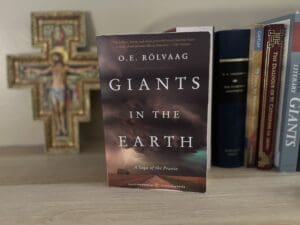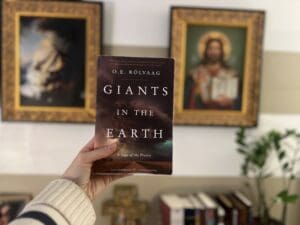It started how all the best things do—a friend asked me to join. Thank you Well-Read Mom for resurrecting my life of reading, for allowing me the space to discover new gifts within myself, and for giving me the opportunity to build up a community of outstanding women. My life has expanded beyond expectation. What a blessing that is.
Although not “American Literature” in the literal sense, Giants in the Earth has become a modern American classic.
There was another young participant at our recent Well-Read Mom meeting–significantly younger than the rest of us. Nestled in with his mom on a leather couch, he was a pretty silent witness to our conversation. Yet, he, like many babies before him, played an important role in our gathering.
What does it look like to yearn for eternity here on earth? C.S. Lewis tells us that “the present is the point at which time touches eternity”.
A New Frontier Written by by Susan Severson I write this on a blizzarding night with Per Hansa and Beret on my mind. The magnitude of our forefathers’ sacrifices is as clear and heavily laden on my heart as the snow on the towering pine trees outside. This is what good literature does. It is…
What I’ve noticed is that there are seasons to my reading rhythms and those seasons often support one another.
As I was reading The Hunchback of Notre-Dame this past fall in preparation for writing member resources, I stepped outside to take a break.
It was a grand adventure living in Hungary for five weeks, but I found myself craving friendship and familiarity: my heart was longing for home.
Tradition is a gentle, living teacher, and books have a unique capacity to discipline our desires and value system.
On this particular All Souls Day morning, with Giants of the Earth in hand, I found myself pondering the diminishment of one skill in particular—the skill of effort—and what that might lead to.










